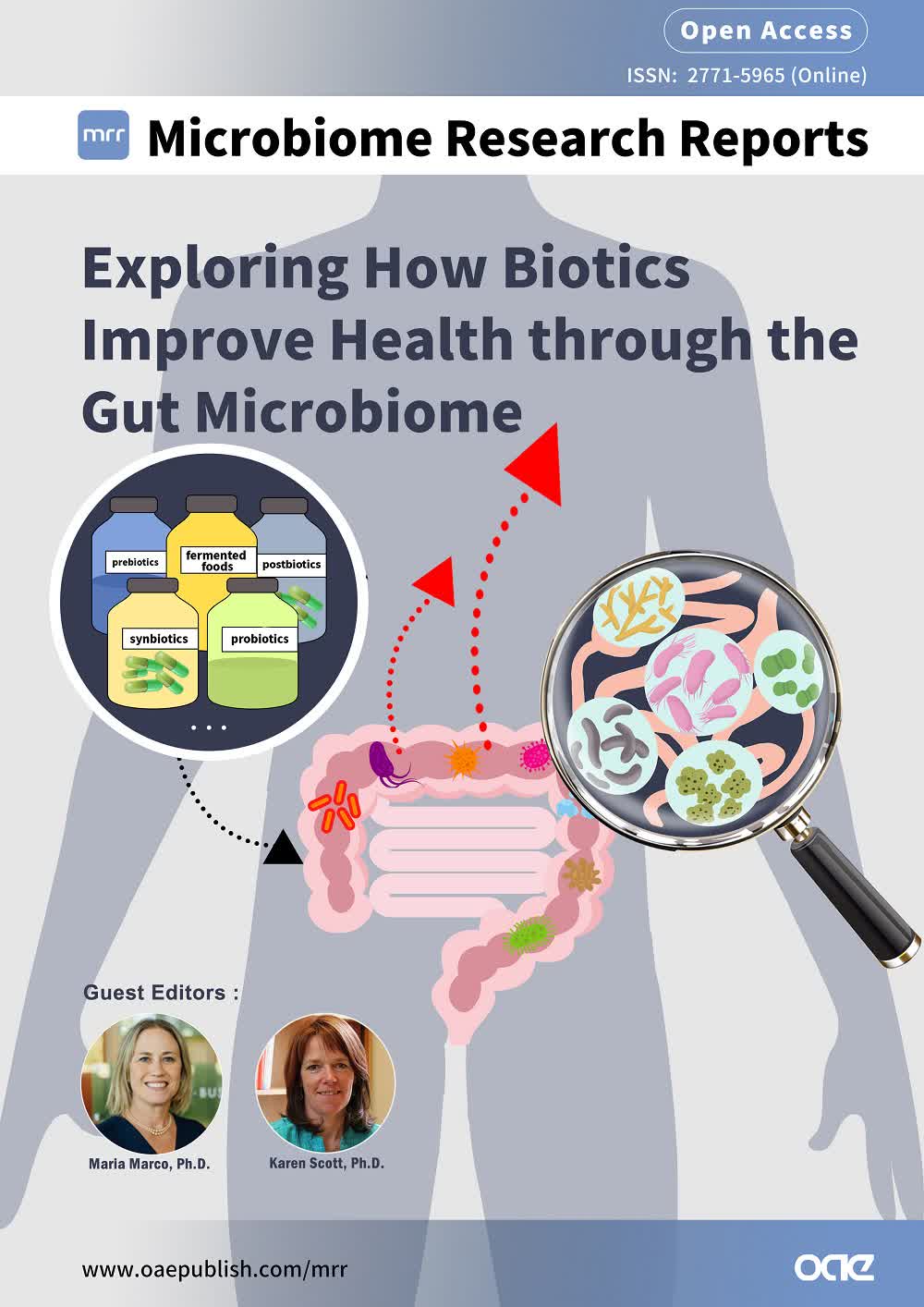
Topic: Exploring How Biotics Improve Health through the Gut Microbiome
A Special Issue of Microbiome Research Reports
ISSN 2771-5965 (Online)
Submission deadline: 31 Oct 2023
Guest Editors
Special Issue Introduction
In concert with the current rapid expansion to our understanding of digestive tract microbiomes, there has been renewed interest to apply microbiome-targeted, dietary approaches for improving and sustaining health. These approaches include diverse biotics, encompassing prebiotics and select dietary fibers, probiotics and live biotherapeutic products, synbiotics, postbiotics, and fermented foods. Biotics are being investigated for use in human and animal populations to prevent and mitigate disease and for long-term health maintenance and overall wellbeing. Despite their long history of use, there remain significant gaps in knowledge on the efficacy of biotics for different health endpoints and the underlying molecular mechanisms responsible for their observed effects. Other outstanding questions include: what is the optimal dose, duration, frequency, and timing of ingestion? what is the influence of regular, habitual diets on the efficacy of the biotic? how does gender, age, environment, or health status influence the outcomes of biotic intake? Addressing these questions will be informative for predicting responders and non-responders to biotic use and recommendations for inclusion in dietary guidelines and in medical practice. Answers to these questions will be reached by developing a robust understanding of the underlying mechanisms through which biotics affect local digestive tract and systemic responses in the body. These mechanisms can occur through direct interactions with the biotics and intestinal epithelial cells or the immune or enteroendocrine systems. Their modes of action may additionally, or alternatively, rely on modifying the activity or viability of certain members of the gut microbiome.
The aim of this Special Issue is to highlight the emerging understanding of how different biotics can alter health, and the role of the indigenous microbiome in contributing to those effects. We welcome manuscripts describing original research, as well as reviews, perspectives, opinions and commentaries on all aspects of biotics - prebiotics and select dietary fibers, probiotics and live biotherapeutic products, synbiotics, postbiotics, and fermented foods - including but not limited to:
● Microbiota composition and functional changes in response to biotics measured by metagenome, transcriptome, metabolome or proteome approaches;
● Potential of biotics to affect health independently of gut microbiome modulation;
● Biotic modulation of the gut microbiome for mitigating and preventing GI tract disorders and diseases;
● Biotic modulation of the gut microbiome for altering gut-brain axis;
● Biotic modulation of the gut microbiome for improving cardiometabolic health;
● Innovative screening approaches for identifying new biotics and biotic formulations;
● Investigations that focus on the elucidation and investigation of the bioactive effector compounds in biotics and biotic formulations;
● Potential of biotics to reduce the spread of antimicrobial resistance.
The aim of this Special Issue is to highlight the emerging understanding of how different biotics can alter health, and the role of the indigenous microbiome in contributing to those effects. We welcome manuscripts describing original research, as well as reviews, perspectives, opinions and commentaries on all aspects of biotics - prebiotics and select dietary fibers, probiotics and live biotherapeutic products, synbiotics, postbiotics, and fermented foods - including but not limited to:
● Microbiota composition and functional changes in response to biotics measured by metagenome, transcriptome, metabolome or proteome approaches;
● Potential of biotics to affect health independently of gut microbiome modulation;
● Biotic modulation of the gut microbiome for mitigating and preventing GI tract disorders and diseases;
● Biotic modulation of the gut microbiome for altering gut-brain axis;
● Biotic modulation of the gut microbiome for improving cardiometabolic health;
● Innovative screening approaches for identifying new biotics and biotic formulations;
● Investigations that focus on the elucidation and investigation of the bioactive effector compounds in biotics and biotic formulations;
● Potential of biotics to reduce the spread of antimicrobial resistance.
Keywords
Digestive tract microbiomes, biotics, health, gut microbiome
Submission Deadline
31 Oct 2023
Submission Information
For Author Instructions, please refer to https://www.oaepublish.com/mrr/author_instructions
For Online Submission, please login at https://www.oaecenter.com/login?JournalId=mrr&IssueId=mrr2310311424
Submission Deadline: 31 Oct 2023
Contacts: Fiona Yin, Managing Editor, [email protected]
Louise Xu, Assistant Editor, [email protected]










